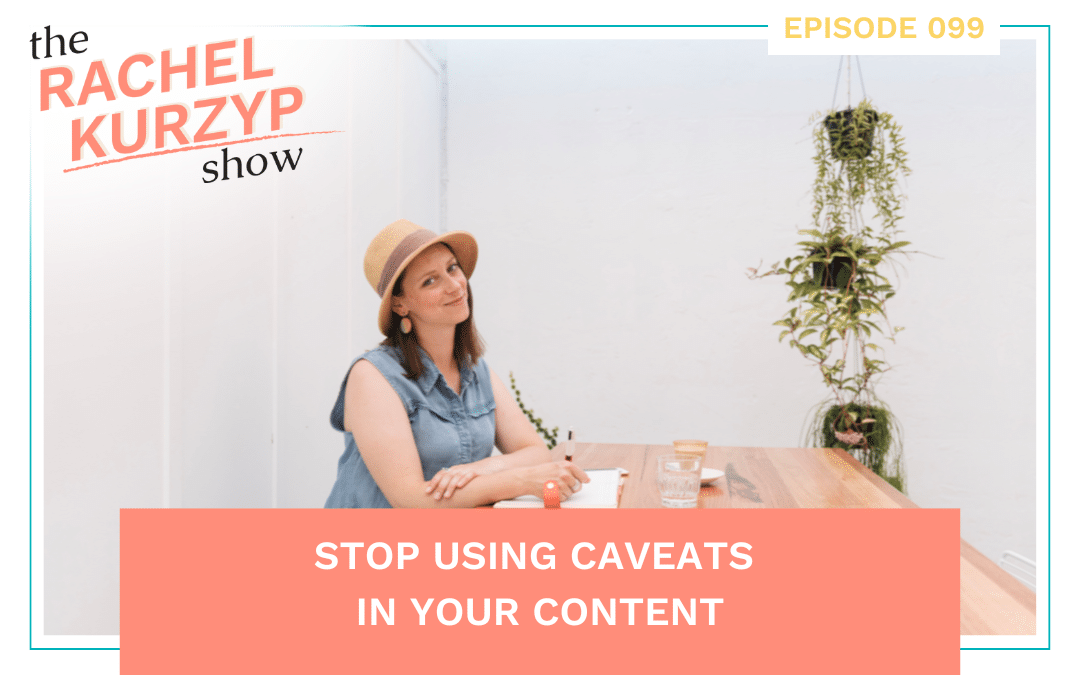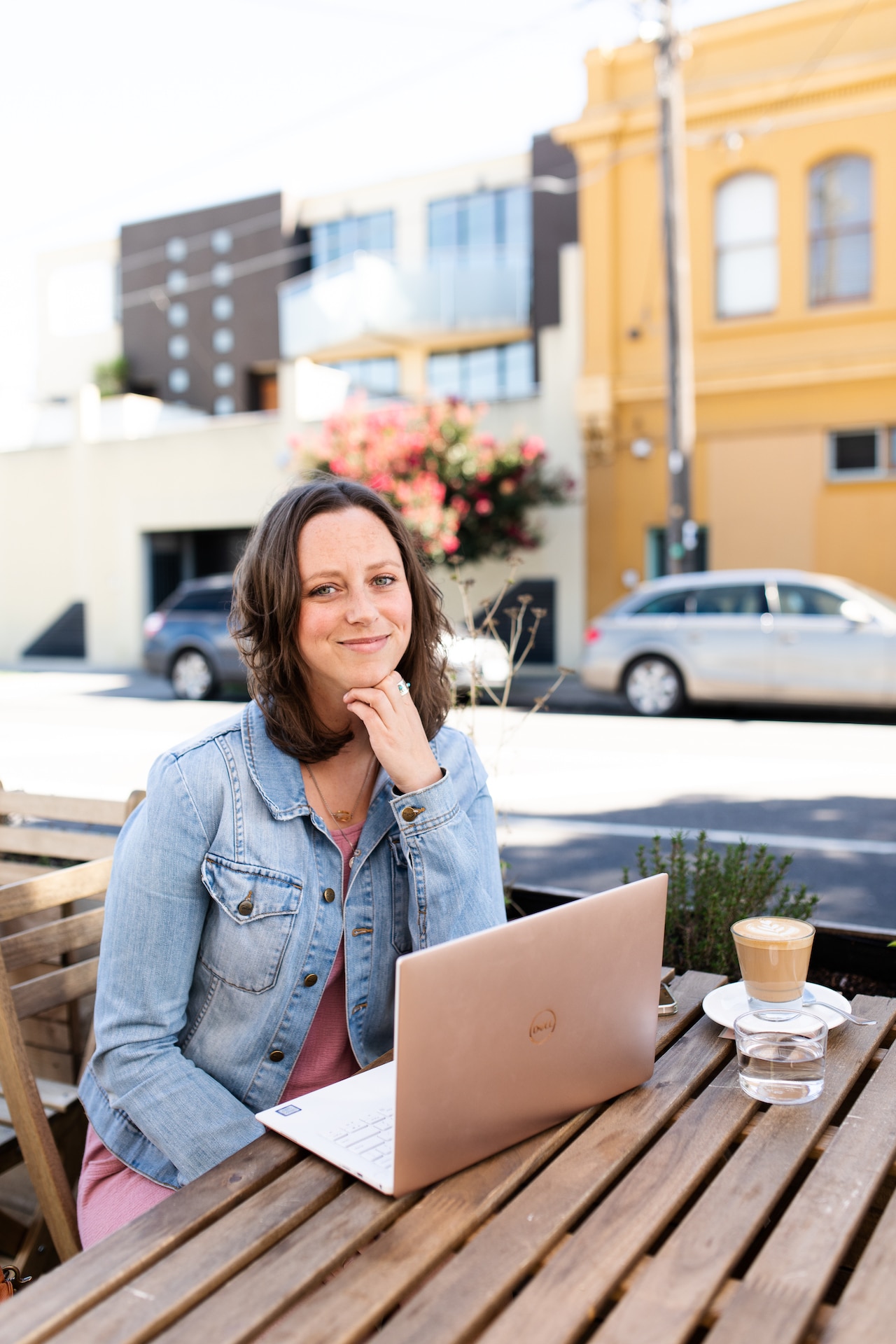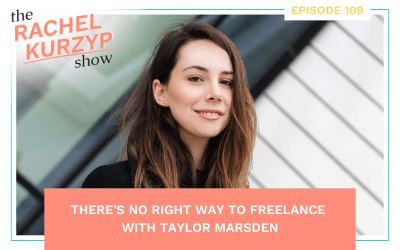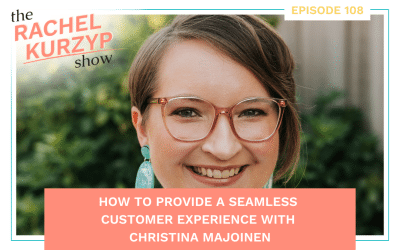Welcome to The Rachel Kurzyp Show.
Today I want to discuss a language shift that I’ve seen grow in popularity over the past few years online.
It’s prevalent in the influencer community, and I’m seeing it filter into the online business space too.
The language shift I’m seeing is caveats.
So what do I mean by caveats?
The basic definition of a caveat is a warning or proviso of specific stipulations, conditions, or limitations.
We see this playing out in the online space, with creators providing detailed personal background information or setting guidelines for the content topic or theme before sharing their opinions.
Here is an example to illustrate what I mean.
I prefer a natural makeup look, so I don’t wear full-coverage foundations. But I’m lucky not to have many blemishes, texture or Rosacea, so if these are concerns for you, totally use your preferred foundation in this step.
In this example, I’m stopping my makeup tutorial to explain why I don’t wear a full-coverage foundation.
And you may be thinking, that isn’t a bad thing in this situation. And it’s not.
But if 30 seconds later, I stopped to explain how I could afford Channel Foundation and not drug store foundation.
And then stopped another 30 seconds in to explain that my makeup brushes were gifted to me, but I still use my Mecca ones too. It would start to get very tiring for the creator and listener. This is how many online business owners deliver content now.
The position of these caveats is just as important as the caveats themselves.
The caveats are always shared just after the creator has introduced themselves, a step in a process or product, but before they share their opinion.
This is in response to how we are served content, aka the algorithm.
Humans love a concise, clear and emotional headline or title. We want to know that if we click on the link, we will be served content that answers our search.
That’s why we love clicking on title formulas like:
The 7 worst fashion purchases you can make this spring
Are you wearing the wrong neutrals for your face?
The Indian street food you have to try (not for those with weak stomachs).
These headlines are broad enough to capture a large audience but niche enough that we feel it is relevant to us on a personal level.
We often engage with content based on what we want from it without knowing the person who created it – or caring who this person is.
That is until we realise they aren’t like us, have different values, aren’t in the same income bracket or have a completely different life.
Then we care and want to let them know that what they think, feel and do is not OK with us.
Creators and online business owners can expect to have a few haters, it’s a right of passage for some.
However, we’re seeing creators rise in popularity and being cancelled faster than ever before.
It’s never been easier but scarier to share your opinion on the internet.
That’s why we’re turning to caveats. It’s a quick and easy way to show we’re self-aware and acknowledge our power and privileges.
It also allows us to proactively prevent criticism by letting everyone who engages with that single piece of content know where we stand and where we come from.
To sum up, we’re trying to appeal to and please the masses while sharing something just interesting and different enough from everyone else to be worthy of attention.
This have-your-cake-and-eat-it-too situation hurts your messaging and, in turn, your sales.
When you’re excessively using caveats, it devalues your knowledge, skill sets and lived experience. Your life and the way you view the world is important too.
It dilutes your messaging because it isn’t clear what your audience needs to remember and what parts are of value.
Your clients and customers choose to work with you because they like and believe in you.
So when your content is stuff with caveats, you say vanilla things like everyone else. Your brand blends in with your peers, and you can’t position yourself as a brand doing things differently.
Instead of using caveats, here are 4 ways you can provide context and personal background and share your values across your content.
- One Instagram post can’t cover your entire professional experience. Instead, clarify your key messages and state background information when it adds value. I’ll leave an example in the show notes of how I did this in a Reel I shared on Instagram
- Have a DEI statement on your website and refer people to it so they can understand your values, personal background, and who you’ve learnt from so you don’t have to explain this information in every email
- Ensure your About page is current and share important information about the clients you’ve worked with, your professional background, and how you work so it’s publicly available to viewers and potential clients
- Instead of trying to go viral and wanting to serve thousands of people, get clear on your dream clients and speak to them. You’re not an influencer; you’re a business owner. I know many of you listening would be able to run a sustainable and profitable business with 100 people or less in your community.
I hope this episode has encouraged you to revisit your content marketing strategy and make the necessary changes to feel confident sharing your opinion online.
Thanks so much for tuning into today’s episode.
If you’ve found what I’ve shared valuable, please leave a review and hit the subscribe button so you don’t miss when a new episode drops every Wednesday.
Resources and links
Book your call: Learn how we can work together in my 1:1 Coaching Program
Website: rachelkurzyp.com.au
Instagram: @rachel_kurzyp





